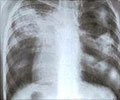Amniocentesis-Glossary
Chromosome: A structure in a cell nucleus that consists of genes. In humans, 23 pairs of chromosomes, each pair containing one chromosome from each parent, carry the entire genetic code.Down syndrome: A disorder caused by the presence of an extra chromosome 21 and characterized by mental retardation and distinguishing physical features.
Abortions: Expulsion or extraction of the fetus from the womb before it is viable, usually before the 20th week of gestation.
Neural tube: structure in early fetal life that develops into the brain, spinal cord, spinal nerves and spine.
Spina-bifida: In the spinal column through which the spinal cord may protrude.
Radiation: Energy carried by waves or by streams of particles. Various forms of radiation can be used in low doses to diagnose disease and in high doses to treat disease
Chemotherapeutic agents: Drugs used to treat cancer.
Metabolic: Having to do with metabolism.
Amniotic fluid: The fluid which, contained in the sac of membranes known as the amnion, surrounds the fetus and provides a shock absorber and a secondary vehicle for the exchange of body chemicals with the mother.
Fetus: Term for an unborn baby from the end of the 8th week after conception until birth
Alfa Feto Protein: A protein produced by fetal tissues and some types of cancers in adults. Usually undetectable in the blood of healthy nonpregnant adults.
Mosaic – An individual with two cell types or more, comprising of different chromosome number or structure
Genetic Counselling - A communicative procedure that undertakes to deal with the problems that rise in a family with the occurrence or the risk of occurrence of a genetic abnormality
Pedigree - A pedigree involves recording a family’s history and making use of a standard set of symbols to represent the status of each member of the family
Allele - An allele is an alternative form of a gene loated on a given locus of a chromosome
Gene – Genes are located on the chromosomes and carry the information representing a protein
Chromosomes - Chromosomes are structures made up of DNA and proteins found in the cells of all organisms. The number of chromosomes is species- specific. In humans it is 46.
Mutant - An organism harboring a mutation
Trisomy - A condition, which arises due to the presence of an extra chromosome. An example is Down syndrome, where the individual has an extra chromosome 21
Mitosis - A division by which the cells reproduce, wherein the resultant cells are the replica of the parent cell.
Meiosis - A special kind of cell division, called reduction division, that takes place in the testes and the ovaries, which produces eggs and sperms that are haploid
Consanguinous marriage - A marriage between two closely related individuals
Euploidy - When an organism has the regular chromosome number, example 46 numbers in humans, it is euploid.
Aneuploidy - When an organism has an abnormal number of chromosomes as in Down Syndrome, it is known as aneuploidy.












